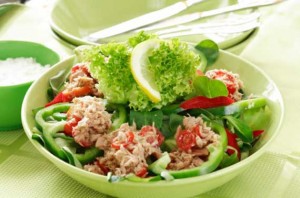Nutrition after a Cesarean Section
Good nutrition is needed to speed healing after your cesarean section (C-section) and give you needed energy. Keep up the same good eating habits you developed while you were pregnant. Eat healthy foods high in protein. Protein helps the healing process and is needed for recovery.
Vitamin supplementation may be beneficial as well. In particular, there is some evidence to show that vitamin C may help with wound healing. Your physician may additionally recommend iron supplementation. In some cases, this is needed to help you to raise your blood stores. It is important to consult with your physician regarding your specific nutritional needs.
Reading the nutrition facts on food labels will help you to learn which foods are high in protein, iron, and various vitamins. Foods high in protein are meat and fish, eggs, dairy products, nuts, dried beans, and peas. Foods high in vitamin C are oranges, grapefruits, strawberries, melons, and papayas. Red meats, dried beans, dried fruits, and iron enriched cereals are high in iron. Vitamin A is found in foods such as greens, cantaloupes, carrots, and sweet potatoes.
Most importantly, you need to stay hydrated. Drink 8 to 10 eight-ounce glasses of fluids each day. In addition to water, this can include milk and unsweetened fruit juices. Caffeinated drinks are okay in moderation, but understand that caffeine is a diuretic (causes you to urinate) and actually dehydrates you.
Vitamins and Iron Supplementation
Your doctor may want you to keep taking your prenatal vitamins in the postpartum period. This may be particularly beneficial if you are breastfeeding. Additionally, as discussed above, if necessary, he/she may recommend that you continue with iron supplementation depending on your specific needs.
Breastfeeding and Nutrition
In women who are breastfeeding, some special nutritional considerations are warranted. Your physician may ask that you continue to take a perinatal vitamin for 6-8 months following delivery. Many vitamins and minerals are needed for the production of breast milk and for your developing baby.
Typically, an extra 300-400 kilocalories (more than non-lactating diet) of food consumption is recommended for the first year as your energy requirements increase when breastfeeding.
Breastfeeding moms should avoid eating fish and shellfish that are known to have a high mercury content (e.g. king mackerel, shark, swordfish). Furthermore, drinking extra fluids is especially important if you are breast-feeding.
Excessive alcohol use should generally be avoided. Most health practitioners believe that one serving of alcohol usually is okay. If consumed, mothers should wait at least 2 hours prior to breastfeeding their baby. If more than one serving is consumed, the general rule of thumb is to wait another 2 hours for each additional serving of alcohol consumed before breastfeeding.
Weight Loss
New mothers on TV get their figures back right away. In real life, it takes a while longer! Gradual weight loss typically occurs over the first 6 months following delivery of your child. Breastfeeding mothers appear to lose weight more quickly than non-nursing mothers. In general, a regular exercise regimen, and healthy eating is encouraged. However, crash diets or pills that promise quick weight loss should be avoided.
While there is no consensus agreement on safe weight loss in the postpartum period, some experts believe that a gradual return to pre-pregnancy weight over 6 months to 1 year is probably safest (approximately 0.5 kg/week).
Bowel Movements
Following a C-section, it is normal to fear the strain associated with a bowel movement. It can be painful! You can minimize constipation and make bowel movements easier by drinking plenty of fluids and eating plenty of fiber-rich foods. Eat fresh fruits, vegetables, and grains that are high in fiber.
Early and frequent walking can stimulate the bowels and speed the return of normal bowel function. Finally, minimizing the use of narcotic medication for pain control following surgery is key. These medications can be severely constipating.
Constipation is not uncommon following a C-section. Medications, lack of mobility, and poor muscle tone in your abdomen can make it harder for you to move your bowels. If you have problems with constipation following a C-section, you should call your doctor. Your doctor may order a stool softener, suppository, or even an enema for you.
Note that the information in this article is purely informative and should never be used in place of the advice of your treating physicians.
More About Self Care After Cesarean Birth
Introduction to Self-care After Cesarean Birth
Preventive Self Care
Perineal Care
Physical Changes and Healing
Vaginal Birth After Cesarean (VBAC)
Breast Care
Activities and Healthy Exercise
Nutrition and Diet
Family Planning and Birth Control
Normal “Baby Blues” or Postpartum Depression
Your Postpartum Check-Up
Get as Much Rest as You Can
When to Call Your Doctor

